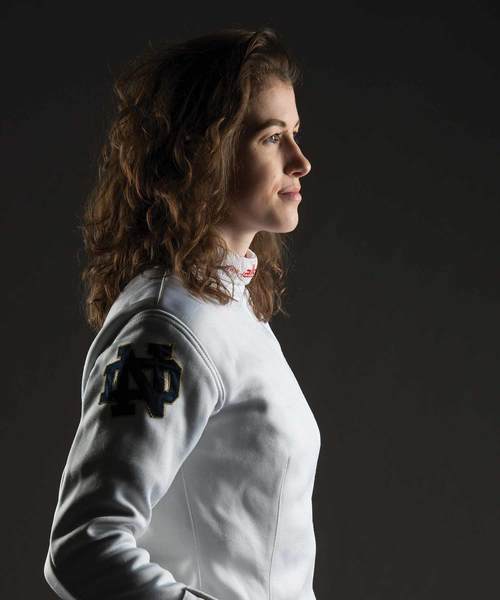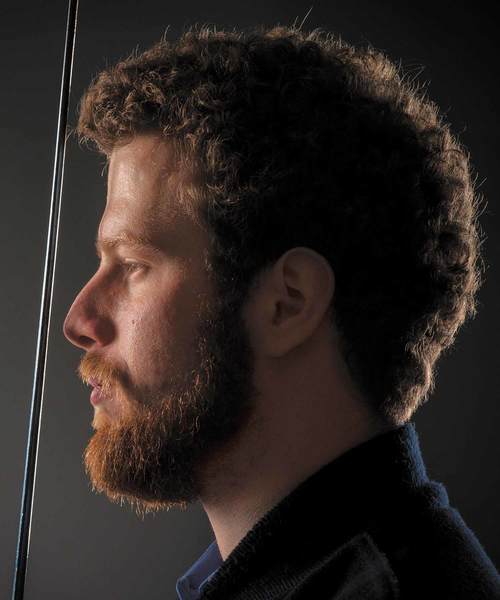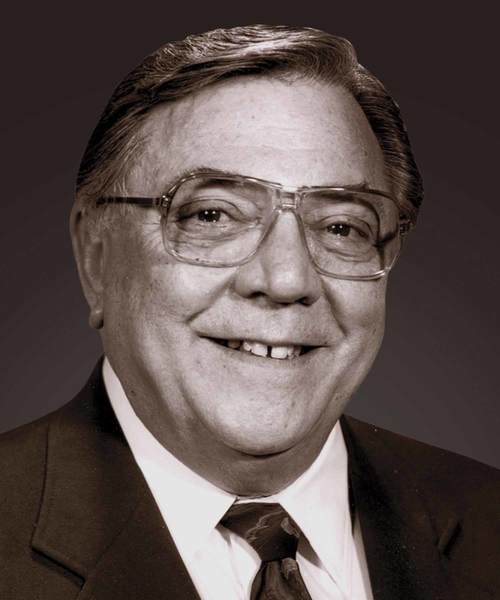
Eva Niklinska
Warming hearts
How often do you receive a handwritten note?
Maybe not very often.
Odds are you remember exactly when you last received one and who sent it, because a rarity like that stands out.
It reminds you how special you are—like a hug you can hold onto.
That’s why University of Notre Dame fencer Eva Niklinska founded Handwritten Hearts, a ministry of kindness and caring for patients at Saint Joseph Regional Medical Center (SJRMC) in Mishawaka, Indiana. As a student at Penn High School (also in Mishawaka), Niklinska and her best friend, Bailey O’Malley, had a desire to reach out to chronically ill patients, but rigorous academics and elite-level athletic demands made it impossible to commit to a regular volunteer schedule.
“We wanted to make an impact, something ongoing, that we could fit in around our other commitments. We came up with this idea of taking handwritten notes to patients in the hospital,” Niklinska says. They began with the oncology and renal units, going once a month to deliver cards and sometimes a small gift for each patient.
Because of confidentiality issues, the girls wrote notes without patient names. Niklinska says, “Bailey and I did a lot of research on what kind of words we should and should not use with critical care patients. We talked to oncologists and cancer survivors and asked them what they would have wanted if they had received a note—what phrases would have been helpful and uplifting and what they would not have wanted someone to write, what might have a negative connotation. We identified key words and phrases to include: positivity, inspiration, continuing the fight. Then we incorporated what we learned, each writing according to our own personality.”
Niklinska and O’Malley established a routine for their hospital visits. After they knocked on patients’ doors, they would introduce themselves and explain the purpose of their visit. Depending on each patient’s dietary restrictions, the girls handed out chocolate at certain seasons. If they were not invited in, they’d leave the cards outside of the room.
“Many of those patients are suffering from chronic illnesses,” Niklinska says. “This isn’t the same as having a cold. Another of the things Bailey and I learned was ultimately to have respect for how each patient chooses to deal with their situation. For me, it was also my introduction into critical care.”
The daughter of two physicians, Niklinska has long had aspirations of her own career in medicine. “My mom works at the South Bend Clinic and my dad works at Cook County Hospital in Chicago. Both my parents are inspirations for me in every respect of what it means to dedicate your life to medicine and being a physician-healer. My older sister is doing her pediatric residency right now in Chattanooga. So it’s in the blood, definitely,” she says with a laugh.
“Health is such an important facet of life. It really dictates the degree to which you’re able to connect with your passions and engage different parts of your character,” she says. Community and global health—and health disparities—are also among her professional and research interests.
She had the opportunity last summer to do research in Alaska at Toolik Field Station with graduate students from Notre Dame assistant professor of biological sciences Adrian Rocha’s ecology lab.
“We studied a certain kind of clump vegetation and how it has changed due to trends from global warming,” she says. “Dr. Rocha’s class evoked in me a responsibility for understanding some of the ecological processes that complement what I hope to do, maybe, if I were to go into medical policy-making.
“The experience was completely revolutionary, though, to be surrounded by that much beauty and nature. I took extra time at the beginning of the trip because I might not be in Alaska ever again. You get in this college bubble and your biggest concern is, ‘What’s my next test?’ I realized I had lost perspective on what it means to be an inhabitant of this earth.
“In the summer there’s no night up there, and so I just decided I would not be concerned about sleeping because there was so much to do. We jumped into the lake when we weren’t in the lab—it was freezing but that was part of the experience—we went hiking, and sometimes I would just sit outside and observe. It was the most amazing experience I’ve had in nature, and definitely created a passion in me to want to hike and travel more.”
Travel isn’t foreign to Niklinska. Although her family is from South Bend, she and her sister spent a significant portion of their childhood in Poland living with their grandparents.
“Our parents immigrated here a little less than 30 years ago,” she says. “My sister was actually born in Poland, and I was born in D.C. While our parents were both completing their medical residencies, our grandparents were helping them out with their two rowdy children.
“Both sets of our grandparents are the most humble, hard-working, kind people that I could imagine. One grandma was a school teacher, so she read Polish books to us and fostered our creativity and imagination. Both grandfathers loved history, so they weaved bedtime stories of knights and princesses with actual historical figures. My childhood was incredible. I’m so blessed to have had grandparents who had such a huge impact on my growth.”
Niklinska also studied abroad in Spain following her junior year of high school.
“Spanish is a beautiful language, with such lyricism. I was first drawn to Spanish music and then enveloped by the text. With such a large portion of our population being Spanish-speaking, learning Spanish is an extra step I can take as a physician to help patients feel more comfortable so I can connect with them on a better level.
“I actually took medical Spanish here at Notre Dame and I volunteer at the Sister Maura Brannick Center on the west side of South Bend. When I’m able to speak with patients in Spanish I already see a smile; they light up. Medicine is such a personal field—to have a physician who speaks your language makes it feel a little less threatening.
“I love the idea of linguistic compatibility. Taking ideas from one language to another gives added depth and richness. For science people there are many ways to formalize curiosity and creativity. Research is one way of being creative but for me, writing is also that, and also rewarding.”
Handwritten Hearts was a way she could volunteer and be creative, applying her talents in writing and artistic applications to interacting with patients in a medical setting.
“I love writing because it’s such a beautiful form to express thoughts, be creative and play with the textures of a text,” she says.
A benefit of letter writing is that sometimes the giver ends up on the receiving end.
“One of the most incredible moments was when Bailey and I received a letter back from a woman to whom we had delivered a card. She said, ‘Thank you so much, it wasn’t expected; it brightened my day, helped me stay positive and made my stay manageable.’ Moments like that help us see that we’re making a difference and give us a glimpse of the patient experience from a personal perspective,” Niklinska says.
Not every experience was a positive one, though.
“Initially I was taken aback that we got negative responses. I grew up very sheltered and always thought if you do something nice for someone they say thank you and that’s just how it works. But negative reactions from patients taught us to build a framework for why it had happened and how we could work to prevent it from happening again.
“Bailey and I had a lot of conversations early on and we adapted our approach as we had different experiences with patients. We did more asking: may we come in, may we take this moment to speak with you, may we sit down, may we hear about your story. You have to ask permission to have someone share their life and experiences with you,” she says.
When it came time for their high school graduation, Niklinska and O’Malley were delighted to pass the baton to Morgan Ludwig (now a freshman at Notre Dame) and Emma Moon, who carried on Handwritten Hearts for the next three years at Penn High School.
“They shadowed me and Bailey for a few rounds of delivering the cards to patients so they could build the understanding that being hospitalized is a very difficult time for patients and loved ones. We tried to serve as mentors to Emma and Morgan and give them guidance about structuring the letters in the ways we had learned were most appreciated. We always told them, ‘Don’t take negative responses to heart. You’re trying to extend a ray of positivity and hope. It’ll reach or perhaps it won’t. Just understand that you may not have perspective on what’s going on.’”
Moon and Ludwig took Handwritten Hearts to new levels, creating so much interest and enthusiasm around their service that it became an official club at Penn, now under the auspices of Morgan’s younger sister Erin. To date, more than 3,500 cards have been delivered to patients at SJRMC through Niklinska’s initiative.
“My dream would be to expand to other schools, to allow other student-athletes to have the opportunity to touch lives, or others who just want that connection but are too busy for set volunteer hours. I’m so proud that it has continued—the girls have done a great job.”
Niklinska herself has been busy submitting applications this fall to medical schools around the country and hopes someday to go into surgery.
“The field has so much potential, especially with advances in reconstructive and transplant surgery, to help individuals who may not have had a chance before. I think it’s a scientific form of creativity and ingenuity. And my sport definitely helps with the kind of dexterity and eye-hand coordination that surgery requires.”
Niklinska began fencing about 12 years ago to be like her sister, Joanna, who was fencing at Stanley Clark School in South Bend.
“I fell in love with the sport, just like my sister had,” Niklinska says. “It’s such a niche community—you get to know and become friends with all the people you’re competing with and alongside. Fencing for the Fighting Irish is one of the things I am most proud of. I’m having nostalgia about being on the strip and we’re not even done with the season yet.”
According to Niklinska, something she struggles with is finding balance.
“I know it’s cliché,” she says, “but especially as a student-athlete you have to balance a lot—not only in athletics and academics but also to prepare yourself for your future. Then there’s the work of finding a balance between developing parts of your character and focusing on yourself and what’s important to you in fulfilling your passions. In the midst of all that is also spending time with the people you care about.
“Everyone has free time, if you know how to prioritize. My regimented schedule for fencing makes me really efficient with my time, which allows me to do so much more. I was junior class president last year. I spend time volunteering. I’m learning how to cook. I wouldn’t say I’m cooking just yet, but I have mastered cereal and salad,” she says with a laugh.
“Notre Dame does such a good job calling you to develop so many parts of yourself. The education here is not just about knowledge acquisition but about forging a character. We are empowered here to do that, to develop an inner understanding of ourselves through intellectual stimulation.
“I love it here,” she says. “If I could recruit everyone to come here, I would. Navy blue looks good on everyone. You can’t tell me it doesn’t.
“My friends say I’m the combination of an old soul and a kindergartener. I like to say I’m positive like a proton—I like being happy and warm and excited.”
When she is at the limits of what she feels she can do, though, she has a helpful philosophy: “Do one more. Look for the small wins. For instance, ‘I actually did well on this test and I thought I wouldn’t,’ or ‘I just did that action on the fencing strip and I’ve been practicing it for months,’ or ‘I just connected with this patient whose story really inspires me.’ Doing one more is taking a small step forward until you can get back on your feet and regain your strength and energy and passion when you feel like you have nothing else left.”
Expect positivity like Niklinska’s to stand out and continue to warm hearts wherever her life’s course takes her.

